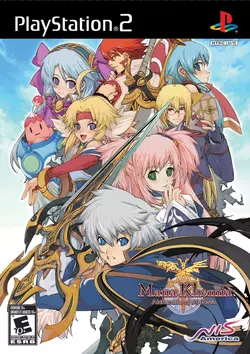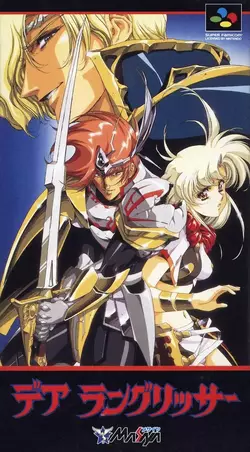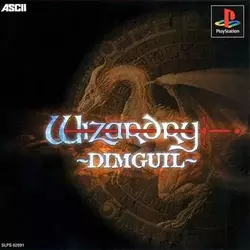I'm never really sure what counts as obscure enough to qualify as a hidden gem, especially since the
most obscure stuff I've played isn't that great, but I picked out some things which might count.
Mana Khemia: Alchemists of Al-Revis

Turn-based RPG with heavy crafting elements on the PS2. It's not the most obscure JRPG since it gets a fair amount of respect here and there, but it's not talked about nearly as much as many other games. It's part of the Atelier series during its period when Gust was experimenting with making more traditional-ish JRPGs instead of the cute girl life sim the series was known for before and after. Mana Khemia in particular goes for being high school life sim with dungeon crawling kind of like Persona 3-5, but not quite so in depth on the life sim stuff.
You got a colorful cast of anime teenagers in a fantasy high school for alchemy, you delve into dungeons to gather materials and complete school assignments, and if you complete your schoolwork you'll have free time to hang out with your party members and watch the sub-stories each of them has, eventually getting a different epilogue at the end of the game depending on which character you had the protagonist closest to. The game takes place over 3 years from the protagonist's first day at school to graduation, and even outside the main plot there's some charm in getting to see the changes over time with all the minor NPCs around the school. The plot of the game is rather light, but throws enough variety of little story arcs at you that it never has a particularly dull section, and the last stretch of the game is able to ramp up to some dramatic stakes fitting for an epic final dungeon and boss fight.
The gameplay is pretty standard 3 niggas in a row type stuff, but you can swap your active and reserve members in-and-out mid-battle, and you even press a button while someone attacks for them swap with a reserve member who will add on a combo attack. There's limitations on how often you can do it, so it adds some strategy in picking the right characters and right moment to switch while racking up big combo damage. Crafting is a big part of the game fitting the alchemy theme, not only can you make equipment that customizes your characters, but you need to make things to unlock the nodes on each character's skill tree. You'll be needing to gather materials a lot, but the game has a system where if you outlevel an enemy group enough you can autowin the fight without needing to go through the whole encounter kind of similar to Earthbound, so backtracking isn't a big deal.
I grabbed the game for cheap on a whim when I was like 14 because it had a catgirl in it, but it turned to actually be a very solid game and I would seriously put it my top 10 RPGs, and I've played close to 100 RPGs. Would only steer you away if you're the type with no tolerance for Japanese Humor™, but in that case you probably weren't interested just from the cover artstyle and description anyway. Also should note there was a PSP port, but from what I've heard it's really buggy and poorly made, so stick with the PS2 version.
Der Langrisser

Strategy RPG on the SNES. It's an overhauled port of Langrisser 2 on the Mega Drive, which naturally is a sequel to the first Langrisser (released as Warsong outside Japan). The plots are distant enough that you don't need to the play the first game to play this one. The gameplay is roughly similar to Fire Emblem where you have your main units you can command to move, attack, and use spells, but each main unit also has a handful of generic units that you hire at the start of each battle that can be given basic commands. Your main units change classes as they level up, going down your choice of branch on a class tree, with their stats and newly learned spells changing accordingly. The type of generic units they can hire also changes with their class. The gameplay is an improvement over the first Langrisser, but to be honest it's nothing amazing and it's very easy if you spend some time grinding.
The big draw is the story, which has branching paths leading to 4 different endings with smaller variations for a couple of them. The premise is an empire aided by demonic forces is taking over the continent and are opposed by a resistance group led by a heroic group of descendants of past heroes. The protagonist Elwin is the descendant of Langrisser 1's protagonist and a simple traveler who happens to get wrapped up in things when he saves a girl with special powers from being kidnapped by the empire, and is recruited by the heroes of light to help in the struggle. Things aren't entirely black and white though, as the continent has been ravaged by war for several generations, and the emperor truly aims for peace via unification under his banner. He also has no intention of letting demons have their way, he and his demonic allies are merely using one another, and so things eventually turn into a three-way fight between the heroes of light, the empire, and the forces of darkness.
Elwin can stay with the heroes and fight the empire and demons, giving you a pretty traditional story with a few dramatic twists in it. This is the default route and the only plot the Langrisser 2 had. Der Langrisser adds 3 additional routes, as you can choose for Elwin to join the empire, agreeing they're the best chance for lasting peace, betraying your allies and fighting against them and the demons. Alternatively, Elwin can betray the empire as well, joining forces with the demons to get power for himself. And finally, Elwin can betray even the demon overlord and take on all three sides with only his few most loyal companions for the goal conquering the continent himself and create peace for both humans and demons.
I played an enhanced port for PC-FX that has voice acting, and it really helped sell the drama. I've never played another game that succeeded as much in making me feel like a piece of shit for betraying and killing former allies on the different routes. The writers really know how to twist the knife so even the deaths of villains on the good guy route often feel pretty bad, but it helps sell the general theme in the game of war being shit and ways people try to go about attaining peace. It's not quite for you if you like your war games to focus on political drama, but its human drama is well executed. The version I played is Japanese-only, but you can play the SNES version via a fan translation, or there's a remake out on Steam and Switch that you can pick up. If you play the remake just make sure to turn on the classic style character art, because the remake art is a travesty. Something that might also be appealing about the remake is it comes bundled with a remake of the first Langrisser, which also has some gameplay changes and adds some extra routes.
Looney Tunes: Sheep Raider

One for the rare "low-budget licensed game that's actually really good" category. I've played a few Looney Tunes licensed games, and Sheep Raider (aka Sheep, Dog 'n' Wolf if you're a Euro) is by far the best of the bunch. It's based off the shorts with Ralph Wolf and Sam Sheepdog, with you taking control of Ralph as he's invited to compete in a game show hosted by Daffy Duck where he needs to steal the sheep Sam is guarding. The result is a unique mix of platforming, stealth, and puzzle-solving as you'll need to navigate the level and make use of the environment and various ACME gadgets to carry away one of the sheep in each level without Sam catching you.
That sounds like it could get straightforward after a while, but the game does well in making every single level unique. Puzzles range from needing to figure out how to catapult sheep across gaps, ferry them across water, use beehives as a distraction, and more. Something fun about the game is that it's able to be funny through the gameplay. Other Looney Tunes games mostly just have some references and quotes from old shorts and a bit of wackiness in cutscenes, but Sheep Raider manages to make the entire process of stealing the sheep and the obstacles you'll run into capture the slapstick spirit of the old shorts. The game isn't super long at 17 levels, but it's able to do a fair amount without ever running out of steam before you're finished.
The game was on PS1 and can be emulated just fine, but it was also ported to PC, easily findable on abandonware sites, and I think I saw some modders spiffyed up the game a bit, so choose whatever sounds nice and convenient.
Wizardry DIMGUIL

A Japanese-made entry in the Wizardry series for the PS1. It's technically the 5th entry in the Gaiden sub-series that was made by devs behind many of the Japanese console ports of mainline 1-6, but the connections are minor so you can play it standalone. Talking about this one is mostly for myself since the game was only released in Japan and has no fan translation as far as I'm aware, I just don't really have any opportunity to talk about it because of that.
If you're not familiar with Wizardry it's a turn-based first-person dungeon crawler and one the earliest vidya RPGs, and the biggest inspiration behind all the early JRPGs. There was a big shake-up in the gameplay between 5 and 6, with Japanese fans of the series mostly thinking 5 was the peak of the series, so the Japanese-made spin-offs generally stick to having gameplay identical to Wiz5, but Dimguil ports in some elements from Wiz6 in there like dual-wielding or the new classes. You make your own party of six with 11 races and 14 classes to choose from and go exploring the dungeon, with stops back at town in between dives to rest and restock. The game has potential permadeath and lets you make as many characters as you want. Because of limitations with the PS1 the game uses manual saves only (no autosaves) so you can reset if you lose someone or party wipe, or you can keep playing and send another team in to try and recover your old team's bodies to revive them.
Story isn't a real focus for the game, but is has some extra flavor to it. It takes place in a fantasy Mesoamerican type of setting (which is unique for the series) and has you diving deep into a temple to rescue a kidnapped priestess from cult members looking to revive their god. As you explore you'll run into some other characters including other parties of adventures trying to complete the same quest as you. There's some neat events and twists along the a way, the big one being that in the final stretch you deactivate a cloaking device and find out the temple was build on an ancient crashed alien ship and the basement areas were actually sections of the sci-fi spaceship the whole. It becomes clear some the weird monsters you fight are actually alien bio-experiments and the god the cult worships is actually some alien emperor in a cryosleep who you fight at the end. Speaking of the monsters, a lot of them have some crazy designs with really detailed sprite work.
Overall, it's a really solid dungeon-crawler that builds well off previous entries and strikes a nice balance of being fairly difficult but doesn't throw as much save-or-suck bullshit at you late-game like some of the other Wizardry games. I've played the first 5 mainline games and the 5 Gaiden games, and I would say Dimguil edges out Wiz5 as my favorite of them, it was a pretty fun time. It's too bad it's not really accessable to many people due to the lack of translation.











